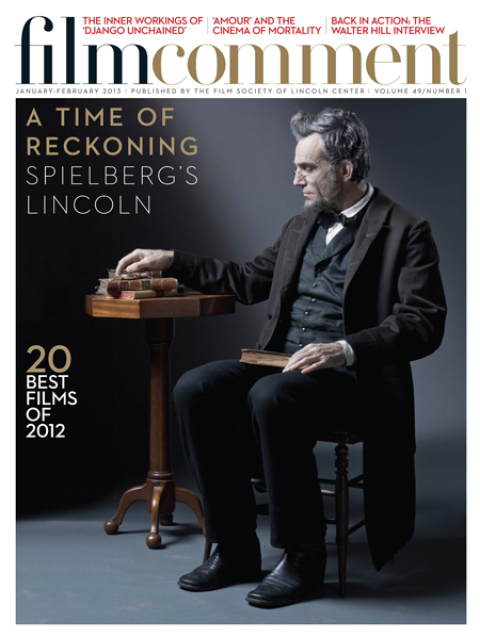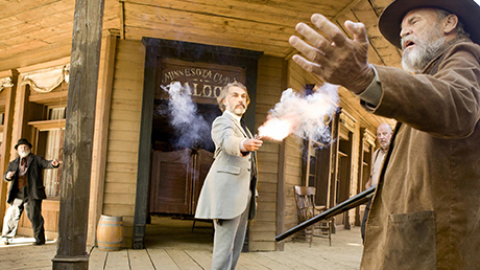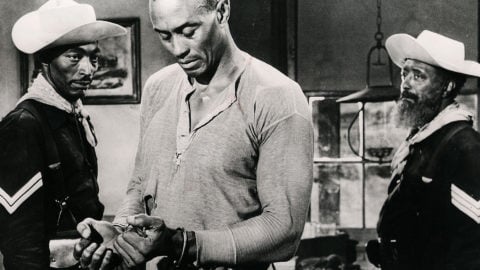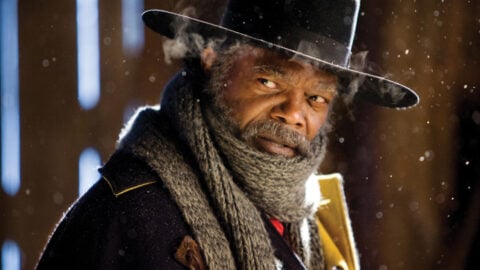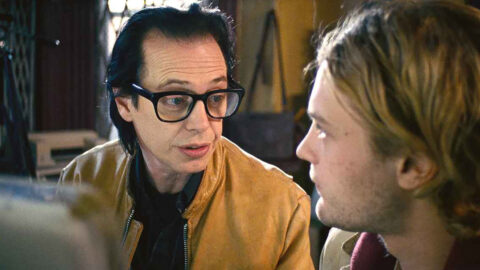
Django Unchained
Django Unchained is not so much a Western as an anthology of potential Westerns. By that I mean to say it is Tarantino doing again what he has done in the past when he proposed six or eight or 12 different ways of making a martial-arts movie or a war movie, some of the ways being elaborated at length and others tossed out as half-perceived jokes that glisten a moment before they melted. At its heart, indeed, it is not a Western at all but a “Southern”—a full-steam evocation of the horrors of slavery, arriving just in time for Christmas. That it is not one movie but several might be gleaned from the range of early reactions it is already eliciting. A respected colleague calls it “torture porn”; a Tarantino enthusiast likens it to Blazing Saddles; Jamie Foxx expresses the hope that it will raise viewers’ consciousness about the history of slavery.
A preview audience laughed more or less uproariously through the first 45 minutes, as Foxx and Christoph Waltz enacted a picaresque and sometimes farcical narrative of bounty hunting, until a scene more appallingly violent than the viewers had perhaps bargained for: the bone-cracking, neck-snapping, eye-gouging fight to the death between two slaves for the amusement of a suavely degenerate Leonardo DiCaprio reduced the room to a spell of muteness.

Django Unchained
Not that there had been a lack of violence up to that point. The body count was already high. But that had been the fun kind of movie-ish violence, executed with comic timing, framed with the dry witticisms Tarantino has crafted for Waltz as the sardonic Austrian dentist-turned-bounty-killer, and punctuated by exploding blood bags in the high Seventies manner. But now, as the film made its entry into its real subject matter—the inner world of plantation slavery—the tonal shifts became more unsettling. It began to seem as if, by taking on history, Tarantino was (once again, after Inglourious Basterds) deliberately risking the smash-up of his delicately balanced movie universe by letting the real world penetrate it.
Tarantino’s has always been among other things a cinema of cruelty, its trademark established from the start by the torture scenes in Reservoir Dogs (92) and Pulp Fiction (94), but it was a cruelty proposed as a test of the viewer’s composure—not callousness but an ironic simulation of callousness in the face of ironically simulated atrocities. It was just a movie, and therefore anything could happen, without consequences: that was the distinct form of cinephilic ecstasy envisioned, an ecstasy further refined by the elevation of trash-talking to a level of baroque stylization and by a narrative discontinuity in which scenes could be laid down like the disparate items of a mix tape. After Kill Bill (03-04) and Death Proof (07), movies in which Tarantino seemed to move away from the emotional strength and linear coherence of his masterpiece Jackie Brown (97), one could have imagined him settling ever deeper into the construction of an alternate world of sheer fetishistic delight, a permanent all-night screening session from which there was no need ever to emerge into the dreariness of sunlight.
He has chosen the riskier path of splicing together truth and fantasy, documentation and parody, joke and atrocity, in ways that constantly endanger the coherence of his film. Django Unchained does not reject the mixtape aesthetic, with its calculated bursts of anachronism, just quick enough to avoid tearing the narrative illusion to threads: Jamie Foxx sporting stylish shades out of a Ray-Ban catalogue or using Frosty the Snowman for target practice, blasts of hip-hop or Jim Croce’s “I Got a Name” on the soundtrack, Leonardo DiCaprio ordering a Polynesian Pearl Diver like Raymond Burr in Fritz Lang’s The Blue Gardenia. And Tarantino’s notion of engaging with history is of course peculiar. His response to Nazism, in Basterds, was to arrange the assassination of Adolf Hitler at a Parisian movie theater.

Django Unchained
In Django, likewise, his response to the evils of slavery is, metaphorically, to blow up Tara after massacring its masters and their hirelings. But there is more than painlessly gratifying wish fulfillment at work here. He cannot ever resist his little joke; the plantation belonging to DiCaprio’s depraved Calvin Candie is called Candieland. But the fun complicates itself to the vanishing point where it might flip over into an un-escapable immersion in real suffering. The balance could not be more uneasy. The first sight upon approaching Candieland is a runaway slave being ripped apart by dogs.
A scene like that could have been lifted from a spaghetti Western of the Seventies, since exploitative sadism has never been foreign to the substrata of the Italian commercial cinema, and spaghetti Westerns are ostensibly the idea in play here. With the title, the theme song lifted from Sergio Corbucci’s 1966 Django, and the throwaway guest appearance by the original Django, Franco Nero, Django Unchained presents itself as an homage. Yet it makes only fitful gestures toward the kind of exacting pastiche of which Tarantino has often shown himself capable. The tone of spaghetti Westerns has always been hard for American filmmakers to capture or even accurately parody (although Richard Pryor managed a hilarious takeoff years ago on television); these are profoundly European films that are not necessarily even about America except as a twisted metaphor for Europe’s own bad dreams. Their form too—as in a rigorously constructed political drama like Sergio Sollima’s The Big Gundown or Corbucci’s starkly abstract The Great Silence—is often classical in the oldest sense of the word, even if the fact was sometimes obscured by badly dubbed and chopped-up prints.

The Great Silence
In fact, aside from some stray images like the band of hooded vigilantes straight out of the original Django, what Tarantino has taken from the spaghetti Western amounts chiefly to liberal dollops of music by Ennio Morricone. (A more precise homage to the mood of Sergio Leone can be found in the opening sequence of Inglourious Basterds.) But it isn’t clear that he is even aiming for that. We are at first more in the rambling mode of revisionist, racially themed Western comedies from the Sixties and Seventies like The Scalphunters and Skin Game, with the violence considerably ratcheted up. The bounty hunter theme echoes Fred Williamson’s “Nigger Charley” trilogy; the white folks’ astonishment at encountering a black law officer does inevitably bring to mind Blazing Saddles; and there is a too-protracted gag involving the inadequacy of the vigilantes’ hoods that seems like a nod to the Coen Brothers’ O Brother, Where Art Thou?.
Ultimately, though, the looming presence here is Mandingo, Richard Fleischer’s initially maligned and now widely admired plantation epic of 1975. It is a film with which Tarantino seems in constant dialogue during the latter half of Django Unchained, and which at moments he seems determined to surpass both in brutality of imagery and in the unalleviated expression of race hatred by DiCaprio and his fellow slave-owners.

Mandingo
The leisurely first part, in which Waltz’s Dr. King Schultz effects a mid-wilderness rescue of Django (Foxx) from a transport of slaves and enlists him as a fellow bounty hunter, seems designed to lull us into thinking we’re in for a more easygoing ride than Tarantino intends. Along the way we get an ample assortment of glorious wide-screen vistas of snowcapped mountains and rugged gullies, even if they seem chiefly decorative. Wide open spaces are not really Tarantino’s thing. He has his sights set on a more claustrophobic destination. We are going southward, not westward; the bounty hunter interlude with its accompanying geographic splendors gives way, as Django and Dr. King Schultz embark on a scheme to rescue Django’s wife Broomhilda (Kerry Washington), to a journey away from the wilderness into the settled heart of a slave-based civilization. At each leg of this journey Django gradually changes into a different movie, the real movie around which the rest is arranged like gift wrapping.
This inner movie has an obsessive force that almost smashes the rest of Django apart. The mood of poisonous evil is pervasive. It is melodrama steeped in authentic torment—melodrama by necessity, since even all the images of brutality and articulations of contempt that Tarantino unfurls here are insufficient to measure the actual torment out of which the melodrama was constructed. As entertaining as Foxx and Waltz are (Foxx a deeply accomplished shape-shifter transforming himself from one scene to the next, Waltz the voice of a foreign skepticism commenting on every sign of irrationality and ignorance), the film takes on a different kind of life with the entrance of DiCaprio’s impersonation of a Southern gentleman in whom exquisite manners and casual monstrousness co-habit. And with the appearance of Samuel L. Jackson as DiCaprio’s faithful house slave Stephen, the tone veers into something both deeper and more grotesque.

Django Unchained
Jackson’s performance is something extraordinary. The part might have been written in the light of Malcolm X’s famous passage on the “house Negro” from his “Message to the Grass Roots” speech of 1963: “[T]hey loved their master more than the master loved himself . . . The house Negro, if the master said, ‘We got a good house here,’ the house Negro would say, ‘Yeah, we got a good house here.’ Whenever the master would say ‘we,’ he’d say ‘we’ . . . He identified himself with his master more than the master identified with himself.” Jackson turns this social abstraction into a rounded, indeed multidimensional being. When he first shows up, emerging from the plantation house as DiCaprio and guests pull up in their carriage, he’s like a parody of the faithful old retainer to be found in countless American films from D.W. Griffith on, and then at every second he proceeds to deepen and widen the portrait into something so powerful it almost blows everybody else off the screen. He’s like a figure resurrected from the crypt of history, a figure not of weakness or compromise but of ferocious twisted strength, his complexity of suffering and cruelty inextricably fused into the face of a hungry ghost.
It’s that hint of ghostly rage that penetrates this central portion of Django Unchained. It is, finally, a movie about slavery, of which there have not been very many, especially if you exclude those that were overt or muted apologies for the institution. In the enclosed spaces of Candieland’s manor house, redolent of a demented feudalism, Tarantino finds the means to evoke a sense of the past that has not previously been evident in his films. There is a séance-like quality to the way he summons up a world of accumulated fears and hatreds. At a certain point the string breaks, the guns start blasting, half the cast is disposed of in short order, and we are back in a more familiar kind of Movieland. The last half-hour is a busy sequence of obligatory shoot-outs and inevitable acts of revenge. But the wall has already been breached and real captive energies released.



